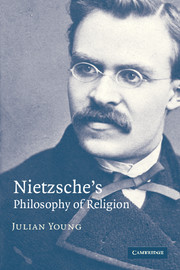Book contents
- Frontmatter
- Contents
- Acknowledgements
- List of abbreviations
- Introduction
- 1 Schopenhauer and ‘Man's Need for Metaphysics’
- 2 The Birth of Tragedy
- 3 Untimely Meditations
- 4 Human, All-too-Human
- 5 The Gay Science
- 6 Thus Spoke Zarathustra
- 7 Beyond Good and Evil
- 8 On the Genealogy of Morals
- 9 The Wagner Case
- 10 Twilight of the Idols
- 11 The Antichrist
- 12 Ecce Homo
- 13 Epilogue: Nietzsche in history
- Bibliography
- Index
6 - Thus Spoke Zarathustra
Published online by Cambridge University Press: 27 October 2009
- Frontmatter
- Contents
- Acknowledgements
- List of abbreviations
- Introduction
- 1 Schopenhauer and ‘Man's Need for Metaphysics’
- 2 The Birth of Tragedy
- 3 Untimely Meditations
- 4 Human, All-too-Human
- 5 The Gay Science
- 6 Thus Spoke Zarathustra
- 7 Beyond Good and Evil
- 8 On the Genealogy of Morals
- 9 The Wagner Case
- 10 Twilight of the Idols
- 11 The Antichrist
- 12 Ecce Homo
- 13 Epilogue: Nietzsche in history
- Bibliography
- Index
Summary
One of the benefits of coming to Thus Spoke Zarathustra (1883–5) with a good grasp of the concerns and continuities of the previous texts under one's belt is that the utterances of its eponymous hero, in themselves often biblical, oracular ink-blots on which to project one's favourite philosophy, become, in most cases, clear and unambiguous. I shall attend to four themes in the work: the critique of Christianity, death, Volk, and the festival. Finally I shall make some comments on ‘the child’, the last of the ‘Three metamorphoses’ of the spirit.
CHRISTIANITY
Christianity, of course, together with such ‘shadows’ as ‘metaphysical’ – i.e. Schopenhauerian – transcendentalism (‘afterworldliness’) from which Nietzsche/Zarathustra is now ‘convalescing’, comes out badly in the work. Section 3 of Part i makes three points. First, ‘suffering and impotence … created all afterworlds’, ‘the sick and dying … invented the things of heaven and the redeeming drop of blood’. Second, such world-‘weariness’ wants to reach the ultimate at ‘a single leap’. And third, that the ‘other world’ is an ‘inhuman … heavenly nothing’ since ‘the belly of being does not speak to man except as man’.
The last of these observations makes the same point as appears later in section 374 of (the final book of) The Gay Science. This section observes, first, that existence has a ‘perspectival character’.
- Type
- Chapter
- Information
- Nietzsche's Philosophy of Religion , pp. 105 - 120Publisher: Cambridge University PressPrint publication year: 2006



